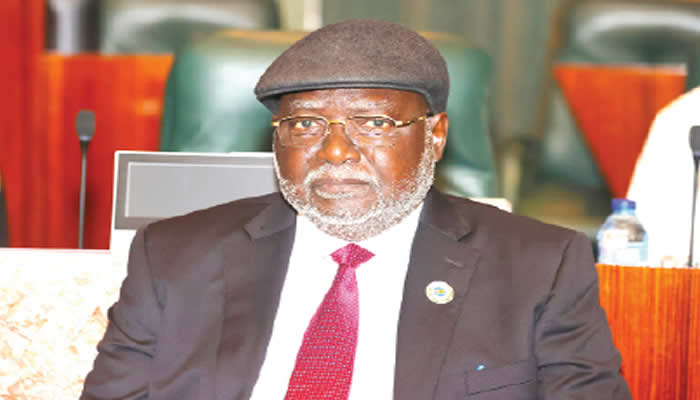
Following a statement by the Chief Justice of Nigeria that the workload of Supreme Court Justices increased after recent retirements senior lawyers say the apex court has only itself to blame, Onozure Dania writes
Professors of law and Senior Advocates of Nigeria have argued that the burden of the workload on the 13 Supreme Court Justices of Nigeria is self-inflicted, as they all know the retirement time and as such should have commenced the processes of replacing those due for the eventuality.
They also suggested that the judiciary should be given complete independence, adding that complete independence of the judicial arm of government is key to the efficient administration of justice, including the appointment of the best as justices of the apex court.
Judiciary Watch reports that constitutionally the Supreme Court is supposed to have 21 justices to adjudicate cases. But this number has reduced in recent times after eight of the justices retired from the Bench, albeit at different times.
On Thursday, September 15, 2022, the Chief Justice of Nigeria, Justice Olukayode Ariwoola, decried the situation, saying that the reduction in the number of justices has become a burden to the apex court. Ariwoola, who at the time was acting CJN, said this while speaking at the valedictory ceremony for retired Justice Abdu Aboki.
Aboki clocked 70 years on August 5, 2022, being the statutory retirement age for justices of the supreme court.
But, while reacting to the reduction of the number of Supreme Court Justices, a former Deputy Director-General and Head of Campus of the Nigerian Law School, Professor Ernest Ojukwu, SAN, said the depletion in the number of justices of the apex court is a self-inflicted wound.
He said, “We all know the date that justices will retire. So why would the leadership of the Supreme Court which also heads the Judicial Service Commission and the National Judicial Council not commence the processes of replacing those due for retirement in time? Why should the issue be left to an emergency situation?
“The same data available to them should inform them of actions to take to budget for the new appointments. So there is simply no reason for complaining to us. Even if all the vacancies are filled, the Supreme Court will still be overburdened. Why? Their burden is also self-inflicted. It is the Supreme Court that lobbied for and got constitutional amendments to allow them to hear appeals from governorship election cases.
“Even on the general subjects of appeal, it is in the hands of the Supreme Court as a policy court to determine the appeals that should come to them. Instead of limiting this access by their decision, they have rather let appeals of all sorts loose on the court. The Supreme Court is the number one enemy of itself.”
On his part, a Professor of Law, Prof Sam Erugo, SAN, empathised with Justice Ariwoola, noting that the “current statutory maximum number of Justices is inadequate for the number of appeals and cases brought to the court.”
The don also noted that the Body of Senior Advocates of Nigeria had demanded lawyers should also be considered in the appointment of Justices of the apex court, saying the BOSAN position must not be ignored.
“In today’s Nigeria, there is politics in everything and this is not helpful. Complete independence of the judicial arm of government is key to the efficient administration of justice, including in the appointment of the best as Justices of the apex court. In that case, the relevance of the Nigerian Bar Association will be appreciated in selecting the best candidates, from both the Bench and the Bar.
“There is just no way the present number of Justices at the Supreme Court can cope with the avalanche of cases that will flow from the coming general elections, while also attending to the already full dockets of the Court. The implication is that the Justices will be overworked, and this is not healthy for the Court whose pronouncements are final. Yes, they can form only two panels in regular cases but only one panel in constitutional matters where a full panel is required.
“These factors will definitely affect the time, but probably not the quality of judgment delivery. Some of the Justices are old, but they have some wealth of experience. I believe the process recently initiated for the appointment of new Justices, with some Justices already shortlisted, will see more Justices appointed for the apex court very soon. We can only urge and plead for an accelerated process to not only reduce the burden on the remaining Justices but to also help in quicker and better judgment delivery”, he said.
A Professor of Practice in International law, Prof Chidi Odinkalu, who said he doesn’t take BOSAN seriously, labelled the body as part of the problem affecting the judiciary.
He said, “As a collective, however, they are part of the problem not part of the solution. BOSAN should probably start from taking out the log in their own eye and reform the process that continues to throw up too many unfit and unsuitable people as SANs.”
Yemi Candide-Johnson, SAN, a Senior Partner at Strachan Partners, reacting to the lament of the CJN, said there can never be enough justices for all the trifling and frivolous appeals that make their way to the Nigerian apex court.
He said that the way to reduce the backlog of cases is not by appointing more justices through opaque and uncompetitive procedures but by rationalising the existing resources, limiting access to the appeal courts, improving the efficiency of the docket and the courts backroom management and imposing a greater discipline on lawyers about how they argue before the highest court.
Chief Solo Akuma (SAN) & Associates said that he agrees with the CJN that the depletion of the number of Supreme court Justices through retirement will increase the workload of the remaining Justices.
“I would suggest that the process of elevation to the Supreme court bench should be expeditiously handled and concluded before the end of this year so that we will have full Compliments of the Supreme Court bench before the commencement of election petitions next year,” he said.
Babatunde Fashanu SAN, the Chairman of the Centre for Anti-Corruption and Open Leadership, CACOL, said that the drop in the number of Supreme Court Justices to just 13 without replacement is disturbing and ought to be remedied very fast.
According to him, 21 is the maximum number of Justices that can be in the Supreme Court at any time under Section 230(2)(b) of the 1999 Constitution of the Federal Republic of Nigeria. No doubt, if we have the full complement of 21 Justices, it will be easier to clear the mammoth backlog of cases.
He said that, from his observation, it takes an averagely of five to eight years to hear a single case.
“Multiple panels can sit simultaneously as a minimum of five is required to hear a case and seven for Constitutional matters and cases in its original jurisdiction. More pressure will be on the Justices with the expected deluge of cases with the advent of the impending 2023 elections,” he said.
“It is not good news that deserving members of the bar presented by the NBA and BOSAN have not been considered for direct appointment to the Supreme Court so far. There is no bar in the Constitution for this to be done as it can only complement the Justices being promoted from the Court of Appeal and make the apex Court richer in the quality of its output.
“It is time to look backwards to the era when late Justice Taslim Elias, a renowned law academic, was appointed straight as the Chief Justice of Nigeria and late Justice Augustine Nnamani was appointed from the bar being the Attorney-General of the Federation just like in the U.S.A. whose Constitution we have copied.
“The only caution I will warn is that anyone put forward by the bar must be subjected to further scrutiny by an independent panel for the suitability, intellectual and character evaluation.”
Yomi Alliyu, SAN, a former executive chairman, Osun State Local Government Service Commission said apex courts throughout the world are policy-making courts, stressing that “they compete with the legislature in making laws, albeit through cases, that determine the lives of citizens.”
Alliyu said, “The Nigerian Supreme Court, on the other hand, is an all-comers court that even adjudicates on divorce from Customary Courts if the party is rich enough to employ the services of lawyers! In fact, in some quarters our Supreme Court is tagged rich people’s court with the speed with which appeals concerning rich people are heard!”
Describing the court as more or less a promotional court when it comes to its membership, the legal luminary said, “About two-thirds rose from the magistrate courts too. Though this helps in dispensing judgments by those who have experience of doing things for a long but their judgments are regimental. Strictly pro establishment unlike the days of Elias, Eso, Oputa, Nnamani JJ.SC et al!
“Even with a full compliment of its membership, the Court can never adjudicate on any matter before it within 5fiveyears not to talk of 13 Justices!
“Its pain is self-inflicted in that it fights against having many divisions like the Court of Appeal. How will 21 Justices decide appeals coming from over 20 divisions of the Court of Appeal with over 100 Justices? Appeals from Lagos, Ibadan, Port Harcourt and Abuja are enough to overwhelm the Supreme Court!”
Odinkalu suggested that there should be a Supreme Court in the six geopolitical areas of Nigeria with at least seven justices.
“Cases that are Constitutional in nature should be decided by a Justice from each of these divisions with the Chief Justice of Nigeria as presiding. This will bring cohesion to their judgments and enhance speedy justice. More importantly, every area of practice; to wit private practice, academia and the bench; should constitute the Supreme Court.”





